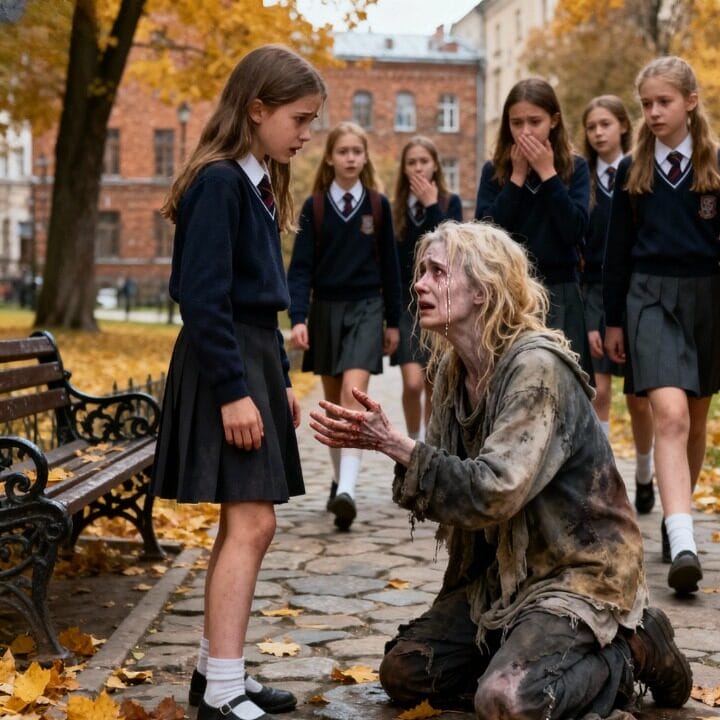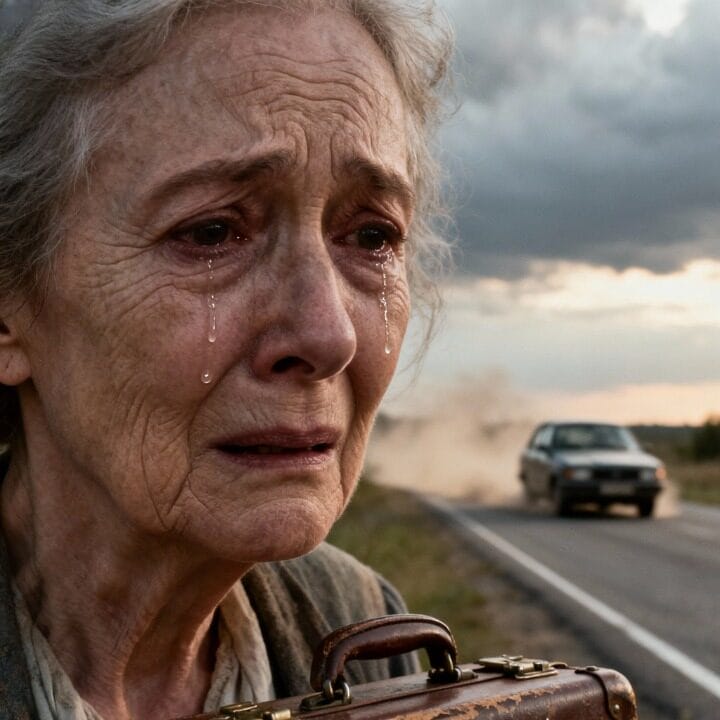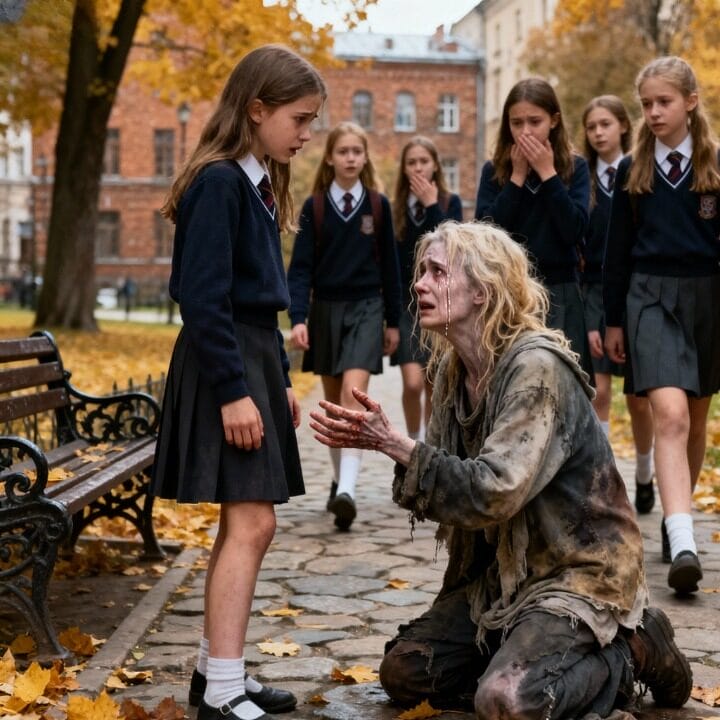The rain had barely stopped falling when fourteen-year-old Clara Carter noticed her again—the woman on the park bench. Wrapped in layers of old jackets, her hair tangled and streaked with gray, she sat clutching a worn teddy bear, staring into the distance as if waiting for someone.
It was always the same. Every afternoon, as Clara and her two best friends, Mia Thompson and Jordan Ellis, walked home from school, they would pass Maple Park, and there she was—sitting on that same bench near the bus stop, lips moving in a whisper only she could hear.
But the moment her eyes met Clara’s, the whispering stopped.
Her face lit up in sudden, desperate recognition.
“Clara!
Mia would always pull Clara away. “Don’t look,” she’d say firmly. “She’s just one of those people—you know, the kind that says weird things. Ignore her.”
But ignoring her wasn’t easy.
Every time Clara heard that woman’s voice—broken, pleading, filled with a strange familiarity—something inside her tightened. Something she couldn’t name.

At home, things were perfect—at least on the surface. Her adoptive parents, Mark and Elaine Carter, were kind, stable, and devoted. Her father worked in finance, her mother taught piano from their cozy living room, and their home in Brookridge, Ohio, looked like something out of a postcard.
They’d adopted Clara when she was four. She didn’t remember much before that—just faint images of a blue blanket, a lullaby she could never quite hum correctly, and the name Star.
It wasn’t a word anyone used around her now, but whenever she heard the woman in the park cry out “Clara,” it felt like a ghost whispering from somewhere long buried.
One gray afternoon in late October, the air thick with drizzle, Clara’s friends had to stay late for a school project, leaving her to walk home alone. The sky was bruised with clouds as she reached Maple Park.
The woman was there again.
But this time, she wasn’t sitting.
She was standing—watching Clara.
Clara quickened her pace, clutching her backpack. But just as she stepped off the curb, her notebook slipped from her hands, pages spilling into the puddles. She crouched to grab them—only to see a hand reach out before hers.
The woman picked up the notebook and held it carefully, almost reverently, as though touching something sacred.
When she looked up, her eyes weren’t wild or vacant. They were full of something else—something heartbreakingly human.
“You have your father’s eyes,” she whispered.
Clara froze.
“What did you say?”
The woman’s lips trembled. “They told me you died.”
Clara’s breath hitched.
The woman stepped closer, her voice trembling between grief and disbelief. “They took you from me,” she said softly. “They said I was unfit. That you’d gone to Heaven. But I know you, Star. I’d know you anywhere.”
The world around Clara seemed to blur. The name—Star—slammed into her chest like lightning.
No one knew that name. Not her teachers. Not even her parents. Only her.
“How do you know that?” Clara whispered.
Tears streamed down the woman’s face. “Because I gave it to you,” she said. “You were my light in the dark. My Star.”
Clara stumbled backward, her heart hammering. The woman’s face—her eyes—something about them was familiar. Not in detail, but in feeling. In some deep, unreachable part of her memory.
She turned and ran.

By the time Clara reached home, her hands were shaking. She burst through the door, soaked from the rain. Her adoptive parents were in the kitchen, preparing dinner.
“Mom,” she gasped, “who is that woman in the park?”
Elaine looked up, startled. “What woman?”
“The one who keeps calling me ‘Star.’ She said she’s my mother. She knows things she shouldn’t—like the birthmark behind my ear.”
Mark’s knife clattered onto the cutting board. Elaine’s face went pale.
For a long moment, neither spoke.
Clara’s heart pounded. “Tell me the truth,” she demanded. “Who is she?”
Elaine looked at her husband, tears welling in her eyes. “Clara…” she began, her voice trembling. “There are things we’ve never told you.”
“What things?”
Elaine hesitated. “Before we adopted you, there was… a lot of pain. Your birth mother—she was unstable, dangerous. We were told she’d disappeared years ago. That she…”
She trailed off.
“That she what?” Clara pressed.
“That she took her own life,” Mark said quietly. “You were placed into foster care, and then we adopted you. You were just a baby.”
Clara’s blood ran cold. “Then how does she know about the birthmark? How does she know that name?”
Neither parent answered.
The silence in the room grew unbearable.
Then came the sound—soft, distant at first.
A doorbell.
Mark frowned. “Who could that be?”
But before he could move, Clara’s instincts told her. She knew.
Her stomach dropped.
Elaine opened the door.
And standing there, drenched in rainwater, her hair plastered to her cheeks, was the woman from the park.
The next few minutes were a blur. Voices overlapping, Mark shouting, the woman pleading.
“Please,” she cried. “I just need to see her. To tell her the truth.”
Elaine’s voice shook. “You need to leave. You can’t be here.”
But the woman wouldn’t back down. “You told me she was dead!” she screamed. “You stole her from me!”
Mark stepped forward. “That’s enough. You need to leave before I call the police.”
But Clara couldn’t move. Couldn’t breathe.
“Why would you lie?” she whispered, her voice barely audible.
Everyone turned to look at her.
The woman’s expression softened instantly. She reached out, her hand trembling. “Star,” she said, voice breaking. “You were two when they came. I was struggling—I wasn’t perfect—but I loved you. They said I’d get help and they’d bring you back. They never did.”
Elaine’s face was white as snow. “She’s not telling the truth,” she insisted, her words shaking. “Clara, we gave you a life she couldn’t. She was an addict, she was—”
But the woman shook her head. “I was sick, yes. But I got better. I looked for her for years.” She turned to Clara. “They sealed the records. I never stopped.”
Something in her eyes—raw, unguarded—made Clara’s chest ache.
It wasn’t madness. It was memory.

The police arrived minutes later. The woman didn’t resist as they led her away, still calling out softly: “Star… I love you.”
Clara stood frozen at the door, watching the flashing lights disappear down the street.
Her parents tried to comfort her, but she couldn’t feel anything.
That night, she lay awake in bed, staring at the ceiling.
Star.
The name echoed in her head.
It wasn’t just a word. It was a heartbeat.
And deep inside, a memory stirred—faint but real. A lullaby, hummed softly in the dark. A hand brushing her hair. A voice whispering: “My little Star, shine for me.”
Clara began to cry.
The next morning, while her parents thought she was asleep, she opened her laptop and searched for local records. She typed in everything she knew: her name, her birthplace, the year of her adoption.
And there, buried in the archives, she found it—an old case file. A custody dispute. A woman named Renee Harper claiming wrongful termination of parental rights after her child’s disappearance. The file was stamped CLOSED, but there it was in black ink:
Child’s nickname: “Star.”
Clara’s breath caught.
She sat there for a long time, staring at the screen.
Then she whispered, “Mom…” — but she didn’t know which mother she meant.
Days later, Clara went back to Maple Park. The bench was empty, only a soggy teddy bear left behind. She picked it up gently, brushing the dirt from its matted fur.
And for the first time, she didn’t feel afraid.
She didn’t know what the truth really was — not yet. But she knew one thing: someone out there loved her enough to never stop looking.
And sometimes, love doesn’t come in perfect packaging. Sometimes it comes worn, wet, and waiting — whispering your name in the rain.
“My Star.”
